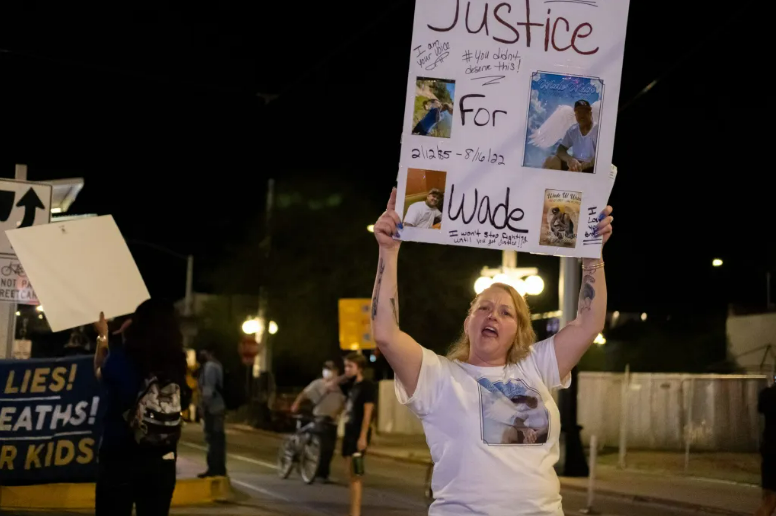
The Nonprofit News Awards (or INNYs) honor excellence in journalism, leadership and community service across the field of nonprofit news. In 2023, INN received 440 entries from 160 member news organizations and gave out 28 awards across 11 categories. A total of 55 judges, including journalists from INN member newsrooms, formed panels to evaluate the entries.
Jump to a category:
Best Investigative Journalism Award | Insight Award for Explanatory Journalism | Breaking Barriers Award | Community Champion Award | INNovator Award | Insight Award for Visual Journalism | Startup of the Year | Journalism Collaboration of the Year | Nonprofit Newcomer of the Year | Emerging Leader of the Year | INN Service to Nonprofit News Award
Honors a single story or series that uncovered significant and impactful news based on the reporters’ own investigation and which advances and serves the public interest.
Arizona Luminaria – Unconstitutional hole: Crisis in the Pima County jail by John Washington, Diana M. Náñez, Irene McKisson, Becky Pallack
Arizona’s Pima County jail has become one of the deadliest in the nation, with the upsurge in deaths coming after the county received a multi-million-dollar grant to reduce jail population and improve care. Arizona Luminaria’s reporting linked numerous individual incidents into a pattern of abusive treatment, proliferation of drugs and outsourced medical care. The series sparked a community movement demanding accountability from county officials responsible for the jail, including from city council members who cited Arizona Luminaria’s coverage in calling a special study session.
Finalists:
New Mexico In Depth – Blind Drunk, a series about alcohol harm in New Mexico by Ted Alcorn

Alcohol-related causes kill more New Mexicans than fentanyl, heroin and methamphetamines combined – nearly three times the national average. Yet this epidemic was hiding in plain sight before the Blind Drunk series exposed it, exploding the myth that the state’s Native population was largely responsible. The series prompted state lawmakers to examine the effects of alcohol abuse, resulting in the proposal of a new Office of Alcohol Prevention and a campaign to raise the state’s alcohol excise tax for the first time in 30 years.
Finalist:
Wisconsin Watch – Chinese prisoners: We were forced to make Milwaukee Tool gloves for cents each day by Zhen Wang
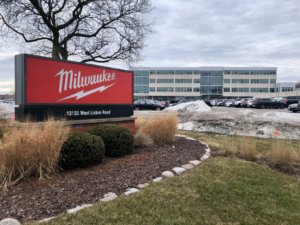
Wisconsin Watch unearthed a mountain of evidence that Milwaukee Tool, an iconic American brand, was using prison labor in China to manufacture its work gloves. This rare look inside the opaque supply chain of an American manufacturer depended on a tip from a recent immigrant and months of verification.
The company says it hasn’t found evidence of forced labor within its supply chain, but the U.S. Department of State has started asking questions.
Finalists:
Texas Tribune, ProPublica, Military Times – Military Injustice

The investigation revealed that soldiers accused of sexual assault are less than half as likely to be placed in pretrial confinement than those accused of offenses like drug use and distribution, disobeying an officer or burglary, and that soldiers charged with severe crimes were increasingly allowed to leave the military rather than face trial. Months of reporting, including unprecedented analysis of the Army’s court-martial database, revealed that a 2021 overhaul of the military justice system had left major gaps in prosecution of sexual assault. A U.S. representative on the Armed Services Committee found the reporting ‘eye-opening’ and called for congressional hearings to examine pretrial confinement.
Finalists:
Honors a single story or a series of explanatory reporting that provides insight and understanding of a significant and complex subject.
Feet in 2 Worlds – Immigrants in a Divided Country by Boen Wang, Rong Xiaoqing, Danya AbdelHameid, Virginia Lora, John Rudolph, Quincy Surasmith
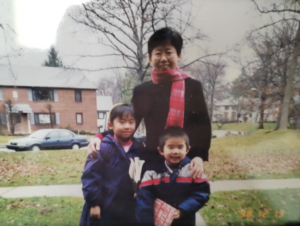
The human-centered series offers different perspectives on the Chinese immigrant experience at a divisive moment in our nation’s history. It explored dramatic shifts in voting patterns within New York City’s Chinese community, introduced artists illustrating the interminable wait for a green card and showed the generational rift between a mother raised in China and her American-born son – painting a portrait as diverse and complex as the Chinese immigrant community itself.
Finalists
Flatwater Free Press – Nebraska’s Dirty Water by Yanqi Xu
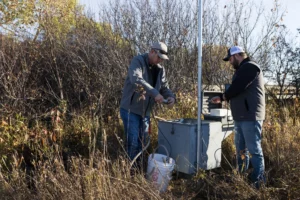
Yanqi Xu’s series linked the source of cancer-causing nitrate and uranium in Nebraska’s water to fertilizer for corn (the state’s top crop), exposed the state government and local boards who denied the problem and provided solutions for staying safe. A resulting water quality town hall brought together 250 residents and a panel of experts to continue the conversation. Following Xu’s reporting, the state’s legislature introduced four new water quality bills.
Finalist:
The Connecticut Mirror – Notice to Quit by Ginny Monk

The multi-part examination of evictions in Connecticut found that women with children, particularly women of color, were disproportionately impacted. Finding women to speak about their experience required weeks of community outreach, but finally paid off. The resulting stories encouraged the state to pass affordable housing legislation that includes tenant protections.
Finalists:
EdSource – A Town’s Library Fight Spotlights Inequities by Emma Gallegos, Zaidee Stavely, Coby McDonald
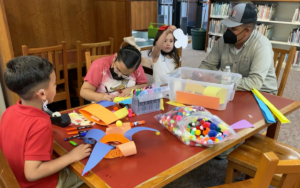
A California town’s library was about to be turned into a police station before EdSource’s explanatory reporting showed it wasn’t underused, just underfunded. The series prompted the library to expand hours from two to five days a week, with the support of a taxpayer group that previously opposed additional county funding. Because that local library was not alone in its plight, EdSource was invited to share its findings on a series of panels across the country.
Finalists:
Honors reporting that brought new understanding to an issue or topic affecting people or communities that are historically underrepresented, disadvantaged or marginalized, resulting in impactful change.
Voices of Monterey Bay – AFTER LIFE: The untold story of how a group of incarcerated men reshaped rehabilitation in California by Julie Reynolds Martínez, Gilbert Bao, Mara J. Reynolds
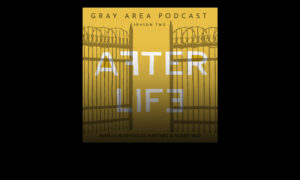
AFTER LIFE gave a voice to some of the most marginalized and forgotten members of society, the formerly incarcerated and those who are still serving time. A collaboration between two podcasters and a former prisoner who served two decades behind bars, it modeled respectful, trauma-aware reporting. The podcast reached 11,000 listeners and catalyzed a new series of activities, including training for journalists working with people who’ve experienced incarceration, conversations between victims and perpetrators of violence and storytelling workshops to help people who’ve been to prison tell their stories and reshape society’s narrative.
Finalists:
The Appeal – A Vital Voice from Behind the Razor Wire by Christopher Blackwell

Christopher Blackwell is entering his third decade in prison. He was also recently named a contributing editor at The Appeal. Blackwell’s work amplifying the voices of people who are incarcerated and weaving their stories into his reporting has benefitted the historically silenced prison population. His coverage secured one man’s chance for post-conviction relief and contributed to growing support for a repeal to stop using prior juvenile adjudications to enhance sentences in adult courts. Now, he’s mentoring other incarcerated journalists and providing them with valuable professional skills.
Finalists:
Searchlight New Mexico and ProPublica – Nowhere to go

Starting in 2018, New Mexico started closing its residential treatment centers for adolescents, who were supposed to be moved to foster care and supported by improved health facilities. Only the first half of that happened, and troubled teens ended up in homeless shelters. “Nowhere to go” directly influenced bills in New Mexico’s legislative session that would increase reporting for the state’s Children, Youth and Family Department, create a task force for runaway foster youth and create an Office of Children’s Rights. The governor vetoed the bills, but issued an executive order to reform the child welfare department.
Finalists:
The Center for Public Integrity in partnership with The Seattle Times, Street Sense Media and WAMU/DCist – Unhoused and Undercounted

The investigation used federal data to reveal that an estimated 300,000 homeless students – disproportionately Black and Latino – were not being counted by their school districts and thus denied federal aid. The Center for Public Integrity made the data and a reporting kit available to other news organizations, resulting in stories by nine local newsrooms, including three who produced powerful, solutions-based packages with localized reporting. Almost immediately after publication, Congress increased funding for homeless-student support by 13%, and two U.S. representatives took steps to address undercounting in their respective states.
Finalists:
Honors an INN member organization that made a significant contribution to the well-being of its community through a journalism-centered project or service.
Open Vallejo – Senior officials ordered destruction of Vallejo police shooting evidence by Laurence Du Sault, Geoffrey King
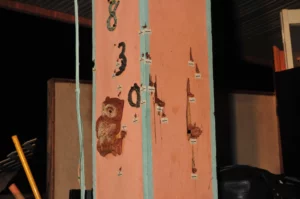
Open Vallejo’s reporting revealed that city officials knowingly destroyed vital evidence in police shootings and violated transparency laws. Their reporting and lawsuit uncovered a troubling pattern leading California’s Attorney General to consider a civil rights investigation into Vallejo police as well as extending Vallejo’s reform agreement with the state’s Department of Justice.
Finalists:
Mission Local – Killer Robots U-Turn

After its first article on San Francisco’s proposal to equip law enforcement with lethal robots made international headlines, Mission Local’s follow up stories led the city Board of Supervisors, which initially approved the proposal, to reverse its decision a week later.
Finalists:
Spotlight PA – Spotlight PA State College

Penn State University had operated for years without scrutiny from investigative reporters. That changed with the launch of Spotlight PA’s State College bureau in July 2022, a four-person bureau that covers 14 rural counties and the state’s most influential institution of higher learning. Since then, Spotlight PA has successfully fought to release court records of a sexual extortion case that Penn State had tried to keep sealed, revealed how the Board of Trustees executive committee likely violated the state’s open meetings laws, and broke national news that the university scrapped a key commitment to combat racism and bias following protests in the summer of 2022.
Finalists:
Global Press Journal – Push for Gold Leaves a Toxic Legacy by Linda Mujuru
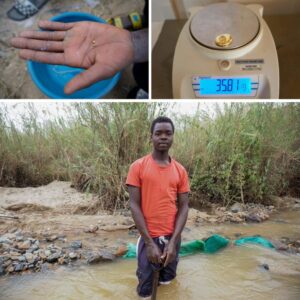
Despite banning the use of mercury in gold mining, Zimbabwe’s government continued to supply mercury, encouraged its use and bought large quantities of mercury-mined gold. Global Press Journal’s cross-platform, multimedia approach was designed to reach mining communities, policymakers and international audiences and included rare footage of the mining process.
Finalist:
For an organization that produced an innovative idea or practice that had a positive financial impact on the newsroom and will help the newsroom serve its community or audience into the future.
Cicero Independiente – Expanding journalism opportunities for organizational sustainability

After unexpected interest from older, monolingual Spanish speakers, Cicero Independiente restructured its fellowship program to create a diverse, intergenerational cohort. By bringing live interpreters into all sessions, and introducing audio and visual journalism techniques that didn’t require writing, it involved a true cross-section of the community in a reporting project relating to local environmental concerns.
Finalists:
Anthropocene Magazine – The Climate Parables by Kathryn Kohm, Wayt Gibbs, McArdle Hankin
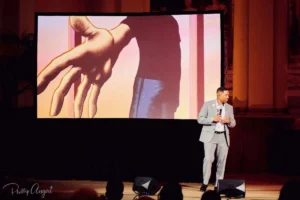
By commissioning a series of speculative fiction from award-winning climate writers, The Climate Parables brings readers into the future through award-winning writers’ imagined solutions for the climate crisis. The series is also set to appear on stages at influential climate conferences. This project hopes to bring the audience past the paralysis and inaction common to this slow-moving crisis and into a hopeful mindset of action.
Finalists:
Sahan Journal – “Tani waa su’aashayda” (or “Here’s my question” ): A voice-note newsletter for Somalis living in Minnesota by Aala Abdullahi, Abdirizak Diis, Michael Tortorello

The audio-only newsletter directly connects to and brings Minnesota’s Somali community together, bypassing the complexities of differing dialects and grammar in the Somali language. Delivered via a series of SMS voice notes, the newsletter always closes with an invitation for feedback, which informs subsequent reporting. The newsletter’s 99% subscriber retention rate showcases its effectiveness and creates a blueprint for reaching other oral-based cultures and communities.
Finalists:
Honors a single story or a series of stories that uses photography and/or other visual media to more accurately portray a community that has traditionally been underrepresented or misrepresented in news media.
Planet Detroit – Claiming Connections by Nina Ignaczak, Thaad & Eden Sabolboro, Amanda Tingley
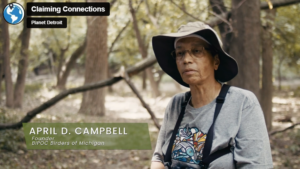
In Detroit, Black-led groups are cultivating access to nature as acts of liberation.
The film shows children and families enjoying birdwatching, fishing, hiking and more, sometimes within Detroit’s city limits. Organizers talk about how their work helps people of color to reclaim a connection to nature, and equips a new generation of environmental activists.
Finalists:
San Francisco Public Press – ‘Everything Is Gone, and You Become More Lost’: 12 Hours of Chaos as Berkeley Clears Encampment by Yesica Prado

The photo essay and accompanying story took readers inside the reality of unhoused residents caught up in a crackdown by Berkeley police and officials, who tossed personal belongings into dumpsters and hauled away cars where people were sleeping. It showed the harrowing experience of people having their lives turned upside down by municipal power. After publication of the essay, Berkeley officials began auditing policies for responding to homelessness and overhauling procedures for engaging with people living in vehicles and encampments.
Finalist:
San Antonio Report – Down to four students, Sam Houston High’s marching band rebuilds to ‘wow’ again by Nick Wagner

The video and photo essay offers a behind-the-scenes look at a band director’s efforts to rebuild Sam Houston High’s award-winning marching band, down to one returning senior at the start of the 2021-22 school year. Viewers are taken to practice, meet youth musicians and get a glimpse of performances as the band is reborn after a shaky start.
Finalists:
The 74 – Weaving a Stronger Society Beginning With Our Schools by James Fields, Emmeline Zhao, Laura Fay, Meghan Gallagher
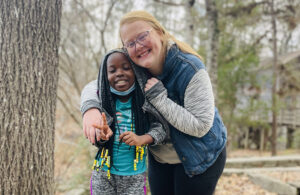
The 74’s series profiled 12 educators and mentors who went above and beyond to bolster schools and communities after the pandemic. Done in partnership with The Aspen Institute’s “Weave – The Social Fabric Project,” it sought to identify the “weavers” holding America’s social fabric together, and tell their stories through videos, photos, and text. Several of the stories were syndicated by local and national outlets, with two of the profiles published as standalone documentaries.
Finalists:
Honors a young organization (operating for less than three years) for establishing strong support of their journalism throughout the community and the revenue growth to sustain it.
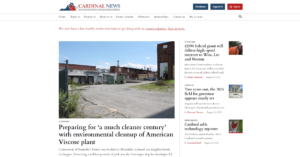
Cardinal News exceeded its initial five-year plan within its first 18 months. Since its 2021 launch, the outlet grew donorship from 12 to 3,000, tripled its staff, quadrupled its annual budget and built a statewide audience. Policymakers rely on Cardinal News to provide information about the often neglected parts of Virginia, and their reporting has led to measurable change, including securing $11 million in aid for flood victims in a devastated Appalachian community.
Finalists:
Honors a news-oriented project or ongoing partnership that exemplifies the culture of sharing and cooperation in nonprofit news and expands the impact of its journalism.
Prism, Futuro Investigates, Latino USA – H-2A Visa Worker Exploitation by Tina Vásquez, Patricia Sulbarán, Roxana Aguirre, Fernanda Echavarri, Andrea López-Cruzado, Penily Ramírez, Lara Witt, Kimberly Rooney 高小荣
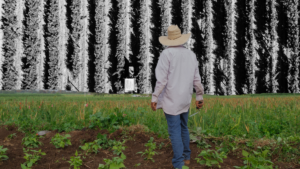
This collaboration between three news organizations examined predatory practices and inhumane conditions within the H-2A visa program, which brings farmworkers to the U.S. The team interviewed workers in North Carolina, their families in Mexico, and used Freedom of Information Act requests to learn H-2A workers were owed millions in back wages because the government said it could not locate them. The two-year reporting effort, published in English and Spanish, prompted the U.S. Department of Labor to launch an initiative alongside the Mexican government that will return millions in back wages owed to Mexican H-2A workers with cases spanning 2011-2021.
Finalists:
Honors an individual who is new to the field of nonprofit news (less than two years) and is contributing to the success of their organization through innovation.
Ashley Clarke of the Center for Public Integrity
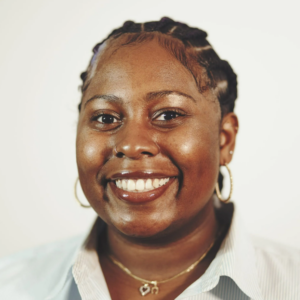
As the audience engagement editor, Ashley Clarke has helped shape how the Center for Public Integrity reports on impacted communities. Her efforts have resulted in equitable partnerships with local newsrooms, particularly those serving communities of color, including a year-long partnership confronting threats to Black homeownership in Washington, D.C., with the Washington Informer.
She’s also taken the role of an investigative journalist and produced coverage leading to the reform of a D.C. housing program. Clarke’s interest in thoughtful, inclusive storytelling began as a child in Baltimore, understanding that “people will tell your story wrong if you’re not in the room.”
Finalist:
Honors an individual with less than five years in executive leadership who is an emerging luminary in the field.
Ryan Sorrell of the Kansas City Defender

Ryan Sorrell founded The Kansas City Defender in 2021. In two years, it’s become one of the nation’s fastest-growing Black digital news startups reaching over 50 million impressions with 50% of its audience between the ages of 13 and 30.
Most notably, Sorrell broke the story of a missing Black woman that prompted the Kansas City Police Department to reinstate their missing persons unit. In addition to his reporting, The Defender’s community engagement efforts–basketball park takeovers and grocery buyouts–have made it a staple in the local Black community.
Finalists:
Jean Friedman-Rudovsky and Cassie Haynes of Resolve Philly

In five short years, Jean Friedman-Rudovsky and Cassie Haynes grew Resolve Philly from a two-person operation to an organization with 24 full-time staff members and a $3.6 million annual budget through effective shared leadership and staff-centered workplace practices.
Resolve’s reporting model is seen as the gold standard for local news collaboration; it has been replicated in dozens of newsrooms worldwide, written into school curricula and cited in case studies as a best practice. Now, they’re helping other newsrooms and journalists through Modifier, a practice change and professional development service that concentrates on earned revenue.
In 2020, the University of Pennsylvania’s Center for High Impact Philanthropy recognized Resolve as one of nine organizations globally with the highest impact return on investment, and a former Pulitzer Prize president called Resolve a groundbreaking solution to the crisis facing local news. In 2022, the co-leaders won the Al Día Women of Merit nonprofit leadership award.
The 2023 awards were made possible with the support of Google News Initiative, The New York Times and John S. and James L. Knight Foundation.
Back to top